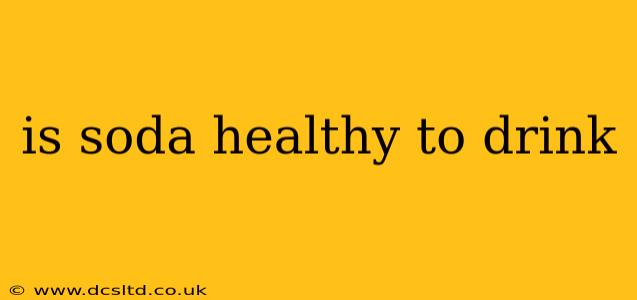The short answer is no, soda is generally not considered healthy to drink. While the occasional sip might not cause immediate harm, regular consumption of soda is linked to a plethora of health problems. This article delves into the reasons why, addressing common questions and concerns surrounding soda's impact on your well-being.
What are the health risks associated with drinking soda?
The primary culprit in soda's unhealthy profile is its high sugar content, often in the form of high-fructose corn syrup. This leads to a cascade of negative health effects:
-
Weight Gain and Obesity: Excessive sugar intake contributes significantly to weight gain and obesity, increasing the risk of numerous health complications. The empty calories in soda provide no nutritional value, leading to increased caloric intake without satiety.
-
Type 2 Diabetes: The high sugar content in soda overwhelms the body's ability to regulate blood sugar, increasing the risk of developing type 2 diabetes. Regular consumption significantly raises the risk.
-
Heart Disease: Studies have linked soda consumption to an increased risk of heart disease. High sugar intake can contribute to high blood pressure, high cholesterol, and inflammation, all risk factors for cardiovascular problems.
-
Tooth Decay: The acidic nature of soda erodes tooth enamel, making teeth more susceptible to cavities and decay. The sugar content further fuels the growth of bacteria that contribute to tooth decay.
-
Increased Risk of Certain Cancers: Some research suggests a correlation between high soda consumption and an increased risk of certain types of cancer, although more research is needed to establish a definitive causal link.
Is diet soda a healthier alternative?
While diet soda eliminates the sugar, it's not necessarily a healthy alternative. Artificial sweeteners used in diet soda have been linked to various health concerns, including:
-
Metabolic Syndrome: Some studies suggest a possible link between artificial sweeteners and an increased risk of metabolic syndrome, a cluster of conditions that increase the risk of heart disease, stroke, and type 2 diabetes.
-
Gut Microbiome Disruption: Artificial sweeteners may disrupt the balance of bacteria in the gut, potentially affecting overall health.
-
Increased Cravings: While initially reducing sugar intake, the intense sweetness of artificial sweeteners can sometimes trigger increased cravings for sugary foods.
Ultimately, neither regular nor diet soda offers significant health benefits. Opting for healthier alternatives is always recommended.
What are some healthier alternatives to soda?
Fortunately, many delicious and healthy alternatives to soda exist:
-
Water: The best choice for hydration is plain water. Infuse it with fruits or herbs for added flavor.
-
Unsweetened Tea: A refreshing and naturally flavorful option.
-
Coffee: Provides a caffeine boost and antioxidants. Limit added sugar.
-
Fruit-Infused Water: Add sliced fruits like cucumber, lemon, or berries to water for a naturally sweet and flavorful drink.
Does soda have any nutritional value?
No, soda offers virtually no nutritional value. It's essentially empty calories with added sugar, artificial flavors, and colorings. It lacks essential vitamins, minerals, and other nutrients the body needs for optimal health.
How much soda is too much?
The general consensus among health professionals is that any regular consumption of soda is detrimental to health. Limiting or eliminating soda intake entirely is the most effective way to reduce the associated health risks.
Can I drink soda occasionally?
While the occasional soda is unlikely to cause significant harm to a healthy individual, it's crucial to prioritize healthier beverage choices the vast majority of the time. Regular consumption, even in small quantities, significantly increases the risk of various health problems.
In conclusion, while the occasional soda might not pose a major threat, regular consumption is strongly discouraged due to the significant health risks associated with its high sugar content and other additives. Prioritizing water, unsweetened tea, or coffee is far healthier for overall well-being.
